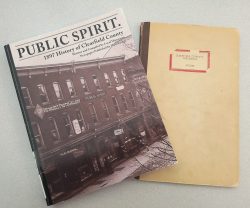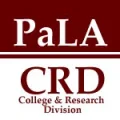Connect & Communicate: AI Literacy for Faculty
Join CRD’s Connect & Communicate Series for a Webinar on
AI Literacy for Faculty
Tuesday, April 14, 2026 from 3:00 PM – 4:00 PM
This session will discuss AI literacy for faculty. While we often discuss AI literacy for students, faculty still require the same conversation and learning skills. Presented by Dr. Elisabeth Davis, Instructional Services Librarian at Lycoming College, this session will discuss various AI literacy sessions that can be held. It will also suggest partnerships which librarians can make through these sessions.
Register at the following link: https://us06web.zoom.us/meeting/register/119lY-kiQ3S1L0e4jL4pKQ
Upon submitting your registration, you will receive an email confirmation that includes details about connecting to the webinar. This is the only notification you will receive. If you do not receive the confirmation email, please contact Elliott Rose at elliott.c.rose@gmail.com.
For this program, you will need speakers or headphones to hear the presenter. Participants are encouraged to ask questions via the chatbox; moderators will monitor the chatbox and facilitate question and response at the end of the panel discussion.
Please continue to share your ideas for programming topics, speakers, or formats with us! If you or someone you know is doing something great in Pennsylvania’s academic libraries, tell us about it! The Connect & Communicate Series of online programming offered by the PaLA College & Research Division aims to help foster a community of academic librarians in Pennsylvania.
Please contact Elliott Rose at elliott.c.rose@gmail.com with questions.
Digital Feminism in the Time of AI
This past January, I was fortunate to participate in the “Exploring AI with Critical Information Literacy” course through the Association of College and Research Libraries (ACRL) e-Learning online website. This course allowed participants the opportunity to interact with artificial intelligence (AI) and think through several information literacy concepts and explore power structures within AI itself. This course sparked my interest in digital feminism and AI, and the blog post below shares my initial explorations.
Over the past few years, AI has become a major battleground for debates about ethics, work, and representation. Feminist scholars interrogate the intersections of gender and technology, and algorithmic systems invite renewed scrutiny through a digital feminist lens. Digital feminism blends feminist ideas with online activism to expose power imbalances in digital systems while envisioning more equitable ways to design and govern technology
Feminist analyses of AI build on foundational critiques of bias in sociotechnical systems. As Safiya Umoja Noble (Algorithms of Oppression) and Ruha Benjamin (Race After Technology) demonstrate, machine learning models reproduce the structural inequalities of the datasets from which they are derived. Gendered, racialized, and class-based hierarchies are not incidental to algorithmic outputs; they are constitutive of the systems’ logics and training processes. The resulting forms of “encoded bias” perpetuate exclusion in contexts ranging from automated hiring and predictive policing to image recognition and language generation.
Rather than treating algorithmic unfairness as a technical problem, digital feminism reframes it as an epistemological and political one. This perspective asks not only how to mitigate bias but whose values and knowledge shape the definition of fairness. Such analyses align with Haraway’s (1988) feminist epistemology and the broader challenge to objectivity, emphasizing situated knowledge and contextual accountability in technological design.
Digital feminism also advances material and creative interventions in AI development. Initiatives like Caroline Sinders’ Feminist Data Set show a move toward participatory and care-centered design. These projects foreground the ethics of inclusion, transparency, and consent in dataset creation, seeking to operationalize feminist principles through applied methods. Similar efforts within global and community-driven AI projects adapt feminist theory to local contexts, challenging Western-centric and corporate models of technological innovation. Such interventions reveal a dual orientation within digital feminism: resisting algorithmic domination while cultivating emergent practices of feminist technoscience. The tradition of feminist hacking, speculative design, and art-based critique plays a crucial role here, converting abstract ethical commitments into tangible, experiential forms of inquiry.
As AI systems reshape the conditions of knowledge production and public discourse, feminist pedagogy offers tools for critical engagement. Developing AI literacy, understood as the ability to interrogate, interpret, and co-create algorithmic systems, requires approaches grounded in collaboration and reflexivity. Within libraries, classrooms, and digital learning environments, feminist educators are fostering practices of co-learning that resist techno-solutionism and promote collective agency. Ultimately, digital feminism repositions the question of artificial intelligence from “how can we make machines more objective?” to “how can we embed justice, plurality, and care into technological futures?” In doing so, it reframes AI not as an autonomous force but as a sociocultural artifact shaped by human choices.
Exploring AI with Critical Information Literacy” with Sarah Morris has an upcoming session in May 2026. The registration link is forthcoming in case you are interested in bookmarking it.
I put together a reading list below to get you started on this topic. If you want to explore more on this topic and are interested in collaborating, please reach out to me (Denise A. Wetzel) directly at dawetzel[at]psu[dot]edu.
- Akinwale, O., Ogunyemi, A., & Oluwatobi, S. (2025). Gender biases within artificial intelligence and ChatGPT: Evidence, sources of biases and solutions. Computers in Human Behavior: Artificial Humans, 3(2), Article 100129. https://doi.org/10.1016/j.chbah.2025.100129
- Atenas, J., Beetham, H., Bell, F., Walji, S., & Swartz, S. (2022). Feminisms, technologies and learning: Continuities and contestations. Learning, Media and Technology, 47(1), 1–10. https://doi.org/10.1080/17439884.2022.2041830
- Bangura, S. (2025, June 3). What does feminist AI look like? And how do we design just processes when using the experiences of survivors to build it? Medium. https://medium.com/wethecatalysts/what-does-feminist-ai-look-like-and-how-do-we-design-just-processes-when-using-the-experiences-of-b62b71bb3c6e
- Schelenz L. (2025). Black feminism and Artificial Intelligence: the possibilities and limitations of contesting discriminatory AI from a critical social theory perspective. Frontiers in sociology, 10, 1602947. https://doi.org/10.3389/fsoc.2025.1602947
- Toupin, S. (2024). Shaping feminist artificial intelligence. New Media & Society, 26(1), 580-595. https://doi.org/10.1177/14614448221150776
- Vachhani, Sheena J. 2024. “Networked Feminism in a Digital Age—Mobilizing Vulnerability and Reconfiguring Feminist Politics in Digital Activism.” Gender, Work & Organization 31(3): 1031–1048. https://doi.org/10.1111/gwao.13097.
Connect & Communicate: History is a Group Project
Join CRD’s Connect & Communicate Series for a Webinar on
History is a Group Project: Cross-Campus Collaboration with University Archives
Tuesday, April 28, 2026 from 3:00 PM – 4:00 PM
This session highlights collaborative projects between university archives and two different college courses that integrated archival materials into the classroom. It explores how cross-campus partnerships can support experiential learning, introduce students to archival research, and position archives as active participants in teaching and learning. The session presenter will be Jessica Mando, University Archivist and Special Collections Librarian at Gannon University.
Register at the following link: https://us06web.zoom.us/meeting/register/cz52fkMlT1uDQiItvzrP5w
Upon submitting your registration, you will receive an email confirmation that includes details about connecting to the webinar. This is the only notification you will receive. If you do not receive the confirmation email, please contact Elliott Rose at elliott.c.rose@gmail.com.
For this program, you will need speakers or headphones to hear the presenter. Participants are encouraged to ask questions via the chatbox; moderators will monitor the chatbox and facilitate question and response at the end of the panel discussion.Please continue to share your ideas for programming topics, speakers, or formats with us!
If you or someone you know is doing something great in Pennsylvania’s academic libraries, tell us about it! The Connect & Communicate Series of online programming offered by the PaLA College & Research Division aims to help foster a community of academic librarians in Pennsylvania. Please contact Elliott Rose at elliott.c.rose@gmail.com with questions.
A tale of locating Pennsylvania Newspapers

The library profession is dealing with constant change, funding battles, and limited bandwidth in the workplace. Since the summer of 2024, these issues have been hitting home since I accepted an interim role at my institution. While I have enjoyed the new challenges, there have been occasional days or afternoons where I can truly focus on my primary role as a Digital Collections Management Librarian. Since those moments are limited, they have become somewhat precious because I am reminded of why I got into librarianship.
I love getting lost in research and going down a rabbit hole of information. Bring in a technical services role, most of the reference questions are related to Pennsylvania newspapers. As part of the role as Digital Collections Management Librarian, I serve as primary contact for newspaper digitization projects and assist in managing the Pennsylvania Newspaper Archive.
Earlier this year, I was presented with a unique situation that started with a thank you note and turned into weeks of research sessions to uncover the location and the current status of a Pennsylvania newspaper. A library user contacted my office to inquire about the status of the Public Spirit newspaper from Clearfield county and how the digitization process was coming along. Up to that point, I had not specifically heard about any requests regarding this title, and I started an investigation by checking the library’s holdings for the title. I found approximately 4 scattered issues that were in stable condition. While I would need to coordinate with colleagues from Special Collections and Cataloging and Metadata teams, this did not seem like an overly complicated request. After another conversation with the library user, I realized that we were not taking about the same set of newspapers. Their request is specifically referring to portfolio books containing 20 years of issues for the Public Spirit newspaper.
This requester has conducted an extensive amount of research on this newspaper title and others, so I continued the conversation to gain as much background information as possible. The ongoing communication provided me with a starting point. Here are the facts:
- An listing for the Public Spirit (Clearfield, PA) is not available on the Library of Congress Chronicling America database. I only found listings and digitized content for the following newspapers:
- My institution did not have a record of this newspaper in its collections beyond the 4 sporadic issues.
- The requestor informed me that there were previous discussions about donating the 20 years of newspaper portfolios to our Special Collections Library.
- The last known location of the newspaper portfolios was with a descendant of the original publisher, Matt Savage.
Beyond these basic facts, I understood the urgency regarding the completion of this digitization project because these portfolios are the most complete set of materials associated with this newspaper title. The original printing house for the newspaper suffered extensive damage from a fire, and many community members and local historians thought this newspaper was lost to time. However, the portfolios were discovered in the attic of a descendant of Matt Savage. The newspaper collection would be used to write a county history book, which was authored by members of the Clearfield County Historical Society.
Over the next few months, I would dig a little deeper during a research session to uncover the mystery. This would include reviewing more departmental records, reading county histories, genealogical searches for the Savage family, consulting with colleagues in the Special Collections Library, and reaching out to cultural heritage organizations in Clearfield county and the State Library of Pennsylvania. Additionally, I studied reports from a multi-phase initiative called the Pennsylvania Newspaper Project to see if the Public Spirit newspaper was included in the NEH grant. All of this work finally gave me the answers. Sadly, the descendant of Matt Savage that owned this newspaper collection had passed away several years ago. An employee at my librarian misinformed the requestor about the collection status, and the newspaper was never donated to Penn State. Fortunately, the owner did donate the newspaper collection to the Clearfield County Historical Society. While the material is certainly fragile, this organization is utilizing best practices for preserving and stabilizing the collection. It is such a reward to know that the newspaper has been located, and I am hopefully that conversations about a future digitization project can begin later this year.
If you are ever having trouble locating a Pennsylvania newspaper, please feel free to reach out to your colleagues. Several members of the Pennsylvania Library Association have extensive knowledge in local history and newspapers. Additionally, the Library of Congress Chronicling America website, the Pennsylvania Newspaper Archive hosted by Penn State University Libraries, and the State Library of Pennsylvania are always excellent resources.
CRD PALS Sponsorship Opportunity
The College and Research Division is offering to sponsor a member to attend the PaLA Academy of Leadership Studies (PALS)! If you are interested in applying for the sponsorship, please check out this link here: https://tinyurl.com/yy3kjcck. The deadline is March 15th.

